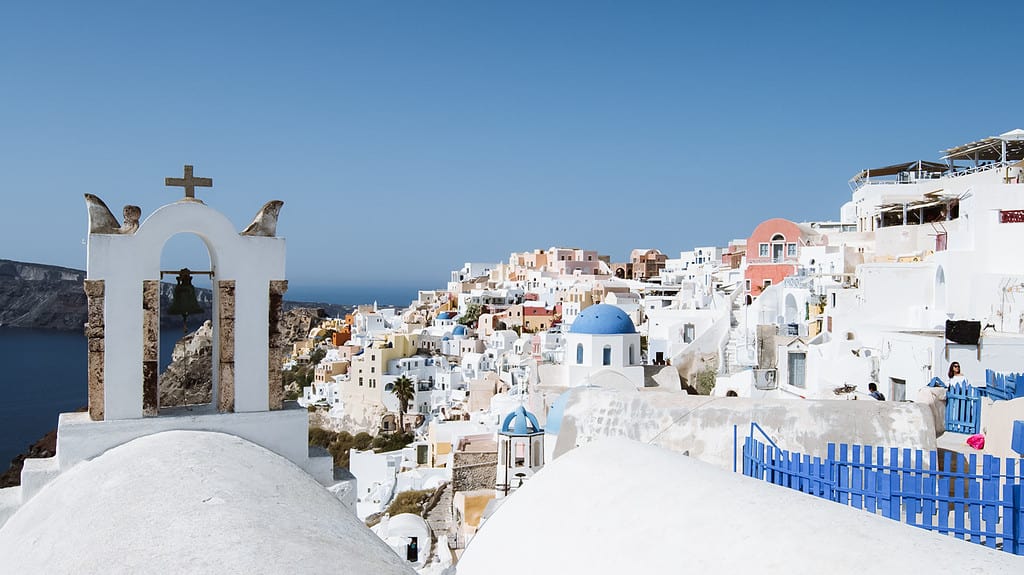TRAVEL GUIDE FOR GREECE
Discover Greece, a country rich in history, culture and natural beauty, from its azure shores to its ancient monuments. From sun-drenched islands like Santorini and Crete to the historical treasures of Athens.
GREECE
17 Things to do in Greece: Best places and islands to visit (+ map)
Welcome to Greece, the realm of mythology, where history blends seamlessly with the…
17 Things to do in Santorini, Greece: Best places to visit (travel guide)
With its blue-domed churches, white-painted houses, unique landscapes and dramatic cliffs, Santorini is…
USEFUL INFORMATION
When to visit Greece
Greece is beautiful all year round, but the weather changes throughout the year, so it depends on what you plan to do in Greece. Here is an overview of what you can expect in each period:
Spring (March to May): Spring in Greece is a time when nature comes alive, blooms wildly and temperatures range from a pleasant 15°C in March to a warmer 20-25°C in May. This period is ideal for visiting archaeological sites and walking around the cities without large crowds of tourists.
Summer (June to August): The Greek summer brings hot and sunny days with temperatures often exceeding 30 °C. Enjoy swimming in azure blue waters and lively beaches. This season is perfect for lovers of the sea, swimming, diving and water sports.
Autumn (September to November): Autumn in Greece is characterised by milder weather with temperatures around 20-25 °C in September and gradually dropping to 15-20 °C in November. It’s the perfect time for hiking and visiting wine regions, when nature is dressed in gold and red. The beaches are not overcrowded and sightseeing is more enjoyable without the summer heat and crowds.
Winter (December to February): Winters in Greece are mild with daytime temperatures around 10-15°C (lower in the mountains). Visit mountain villages, enjoy winter sports in mountain resorts or explore towns and sights without the crowds.
Transport in Greece
Public transport
Public transport in Greece is efficient, comfortable and affordable. It provides easy access between towns, to historical sites and to picturesque islands.
The Greek railways, operated by the Hellenic Railways Organisation (OSE), are a key part of the public transport network, connecting major cities such as Athens, Thessaloniki and Patras. Although the rail network is not as extensive as in some other European countries, trains offer reliable and comfortable travel between the main regions.
Bus transport plays a vital role in Greece, especially in areas where railways do not reach. KTEL’s extensive network of buses covers the whole of Greece, connecting towns and remote villages and is a popular choice for travelling on the mainland due to its accessibility and frequency of services. KTEL buses are key to reaching many tourist destinations, including beaches, mountains and archaeological sites.
If you are looking for bus services for a specific city or locality, enter KTEL and the name of the city in the search engine.
Ferry services are essential for travelling between the Greek islands. Ferry companies such as Blue Star Ferries, Hellenic Seaways and Anek Lines provide regular and reliable connections between the mainland and popular islands including Crete, Mykonos, Santorini and many more.
By car in Greece
Travelling around Greece by car is the perfect way to explore the country on your own. It offers unlimited freedom to discover hidden treasures and less touristy sites that are off the main routes.
Obligations: In Greece, you must keep your daytime running lights on outside urban areas, wear your seatbelt with all passengers, and obey speed limits and blood alcohol level rules.
Road network: the Greek road network includes modern motorways and smaller roads that take you to all corners of the country, including remote villages and seaside resorts. Roads in mountainous and remote areas tend to be narrow, winding and often offer fantastic views.
Tolls are collected on most major motorways, such as:
- The A1 motorway (E75), connecting Athens with Thessaloniki and continuing to the border with Northern Macedonia.
- The A2 (Egnatia Odos) motorway, which stretches across the northern part of the country from the border with Turkey, through Alexandroupoli, Komotini, Xanthi, Kavala, Thessaloniki, to Igoumenitsa on the west coast.
- The A6 (Attiki Odos) motorway, which is an important urban ring road in Athens, offers a quick transfer between different parts of the city and to Eleftherios Venizélos International Airport.
- Another major highway connecting different parts of mainland Greece and the Peloponnese peninsula.
Tolls are usually paid in cash or by card at toll gates along the motorways. Some motorways offer an electronic toll option where you can use a special device for automatic toll payment (called e-pass).
For passenger cars, the average toll in Greece can range from around €2 to €5 per 100 km. However, the final price depends on the specific motorway and section.
Maximum speed limit: In general, the maximum speed limit on Greek motorways is 120 km/h and on main roads 90 km/h. In towns and populated areas, the speed limit is 50 km/h unless otherwise specified.
Parking: in larger cities like Athens and Thessaloniki, parking can be a challenge, but most cities offer paid parking or special parking zones. In smaller towns and villages, parking is usually easier and often free.
Culture and tradition in Greece
Culture
Greek culture is rich and varied, going back deep into history and yet open to new influences and innovations. From the ancient Olympic Games, which have been revived as the modern Olympic Games, to traditional Greek festivals and ceremonies, Greece has preserved its cultural wealth for future generations. Its rich history is recorded in numerous archaeological sites and museums scattered throughout the country.
The country is home to important figures in literature and music, including ancient philosophers such as Plato and Aristotle, and composers such as Mikis Theodorakis.
Support for the arts and culture can be seen at every turn in Greece, from festivals such as the Athens and Epidaurus Festivals to literary evenings and art gallery exhibitions.
Traditions and festivals
One of the most important traditions is Easter, the most important Christian holiday in Greece. The preparations begin with Holy Week and culminate at midnight on Holy Saturday, when people gather with white candles in the squares and churches, waiting for the “Anastasi” (Resurrection), and then illuminate the night with the light of their candles. This is followed by the traditional family lunch on Easter Sunday, at which lamb is served, symbolizing renewal and celebration of life.
Another unique tradition is the “Panigiri” festival, which takes place in many villages throughout Greece during the summer months. These village festivals, often associated with the patron saint of the local church, are an expression of a deep sense of spirituality, community and joie de vivre. People come together to eat, drink and dance late into the night.
The family plays a fundamental and central role in Greek society, which distinguishes it from many other European countries where the emphasis tends to be more on individual independence.
Family celebrations, meals and gatherings are a normal and important part of everyday life, not only on special occasions but also on ordinary days. This strong sense of belonging and family is also reflected in the way older family members are integrated into everyday life – it is common for several generations to live together or to be very supportive of each other.
Typical dishes in Greece
Greek cuisine is renowned for its diversity and richness, influenced by its long history and geographical location, linking Eastern and Western gastronomic traditions. Each region in Greece brings its own specific flavours and specialities, from the sea delicacies of the islands to the spicy meat dishes of the mainland.
Typical and popular dishes you can taste in Greece include:
- Moussaka – A layered dish of aubergines, minced meat and béchamel sauce, baked until golden brown.
- Souvlaki – Marinated pieces of meat on a skewer, grilled and often served with pita bread and tzatziki.
- Horiatiki – Authentic Greek salad with tomatoes, cucumbers, onions, olives and a piece of feta, seasoned with olive oil and oregano.
- Fasolada – Traditional Greek bean soup, considered the national dish, rich in vegetables and olive oil.
- Baklava – Sweet dessert made of layers of filo pastry, nuts and honey
Greek cuisine emphasises fresh and quality ingredients, using seasonal vegetables, fresh fish, olive oil and herbs to give each dish its distinctive flavour. In recent years, there has been an increased interest in local and sustainably produced food in Greece.
Drinking water in Greece is safe to drink straight from the tap. As for tipping, it is common in Greece to round up the bill or leave a small tip as a thank you for good service.
☞ See all destinations.


